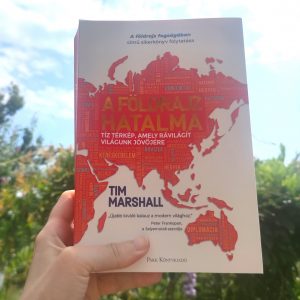I have read Tim Marshall’s first book about geopolitics, Prisoners of Geography a few years ago, this one picks up where that left off with new maps to explore and topics just as intriguing.
Geopolitics and the international order might be one of my top five favorite topics to read and talk about, so it’s no surprise I love Tim Marshall’s writings. His Prisoners of Geography was a world-wide best seller, it contained ten chapters, that is ten maps of somewhere in the world starting with a brief history, then detailing all the geopolitical context down to recent day politics. It’s a fascinating read. That first book’s table of content includes Russia, China, The United States, Europe, Africa, the Arab world, India and Pakistan, Korea and Japan, Latin America and the Arctic. It explores all these places to bits and pieces to the depths of their international relations, even down to who might be interested in attacking whom and why, and what geography has to do with all of it (spoiler alert: everything!).

The Power of Geography continues on the same line, with ten more regions to scrutinize, this time Australia, Iran, Saudi Arabia, Great Britain, Greece, Turkey, the Sahel, Ethiopia, Spain, and the outer space. The author’s historical and political expertise coupled with his cosmopolitan world view and insights from his travels as a journalist makes his writing feel accurate like a textbook but also very enjoyable to read. Might not sound like a summer read, but I actually read it on a summer weekend recently. I read the Sahel chapter just around the days when the latest conflict in Niger broke out and the book provided a useful context to make sense of what’s going on over that remote part of the world.
And speaking of remote conflicts, if I had to choose the most important takeaway from this book, and this is also true for the first one, it’s that everything is connected and no land is far enough to have no impact whatsoever on the life you live however many kilometers away. The Sahel, for example is a land rich in minerals used in computing thechnology, and once it becomes unreachable under the control of local militias (that is kind of happening in the past few weeks), it might cause production difficulties in several industries. Also, Africa is the most populous continent of the world with the hardest living conditions. Even without conflicts more and more people will feel the need to look for more humane living conditions elsewhere, which has already caused political tensions in several European countries and the European Union itself in the past years. And migration will remain a problem to be solved.
I might be repeating myself, but I truly believe that understanding is power. Especially in this day and age, when the news come wrapped in so much noise that it’s hard to sort out what’s real and what’s fake, it is important to stay informed and these books can help you look deeper. I recommend both for that, but also because they are really enjoyable to read. The author published another book in between these two, Divided: Why We’re Living in an Age of Walls, and his latest came out just a few months ago titled The Future of Geography, which seems to be exploring the last chapter of The Power of Geopgraphy further. Exploiting the potential of outer space and the space race going on among developed countries is an extremely current topic, so I can’t wait to read that one, but ‘Walls’ is on my shelf for a while now, so it might come first.
After reading The Power of Geography, I’ve listened to a podcast episode with the author (mostly) about this book and also found out he had his own podcast, called The What & The Why that I’ve yet to dive in (I always have too much on my podcast playlist to listen to…), but I am really interested.
Have you read any of Tim Marshall’s books? Which one is your favorite and why?


1 thought on “Blabbing Tim Marshall’s The Power of Geography”